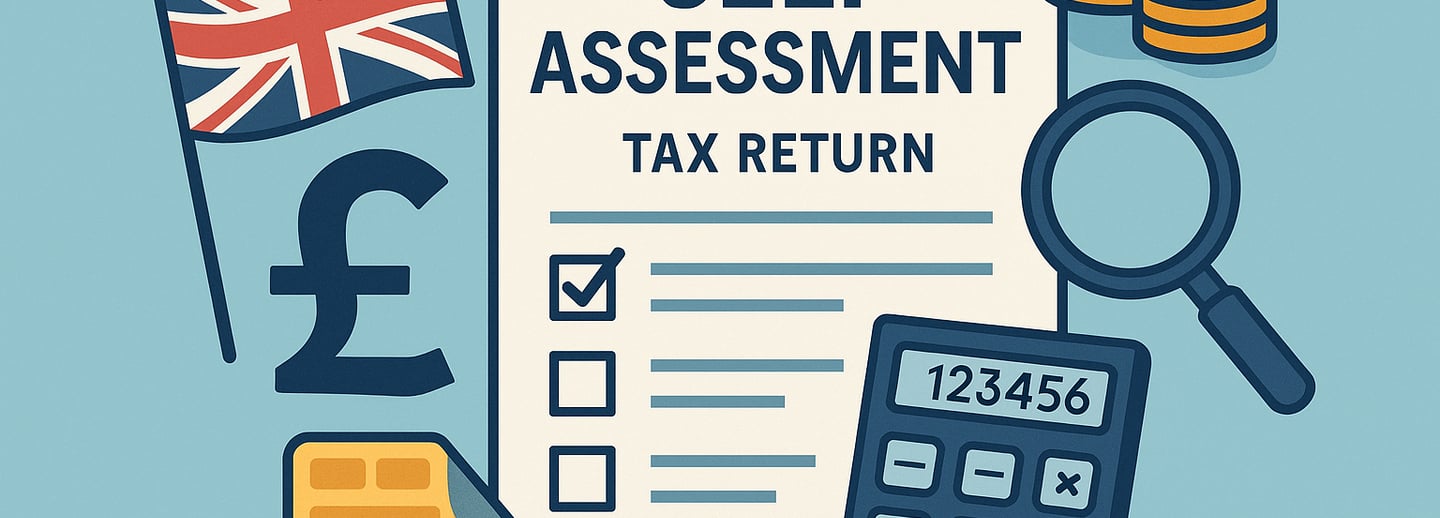Introduction: Understanding Self Assessment Tax Returns in the UK
MNG Accountants Ltd
6/14/20253 min read


Introduction: Understanding Self Assessment Tax Returns in the UK
Filing a Self Assessment tax return in the UK is a legal requirement for millions of individuals each year. Whether you're self-employed, a company director, or have untaxed income from other sources, it is crucial to meet your tax obligations in line with HMRC regulations. This detailed guide will answer key questions about self assessment tax return requirements, deadlines, and how MNG Accountants Ltd can help you stay compliant and stress-free.
1. Who Needs to Complete a Self Assessment Tax Return in the UK?
You must file a Self Assessment tax return (SA100 form) if any of the following applies to you:
· You are self-employed as a sole trader and earned more than £1,000.
· You are a partner in a business partnership.
· You are a company director receiving untaxed income.
· You earn more than £150,000 in a tax year.
· You earn over £60,000 and receive Child Benefit.
· You have rental income from property in the UK or abroad.
· You have income from savings, investments or dividends not taxed at source.
· You receive foreign income.
· You need to claim tax relief on pension contributions or charitable donations.
· HMRC has sent you a notice to file a tax return.
If you're unsure, MNG Accountants can assess your situation and advise whether you need to register for Self Assessment.
2. What Incomes Are Required to Disclose in the SA100 Tax Return?
The SA100 form requires full disclosure of all income, including:
· Employment income
· Self-employment income
· Partnership income
· Property rental income (UK and overseas)
· Dividend and interest income
· Capital gains from the sale of assets (property, shares, etc.)
· Foreign income
· Pension income
· Trust and estate income
Accurate reporting of these income types is essential to avoid penalties and over- or underpayment of tax.
3. Does Residency Status Impact Income Disclosure?
Yes, your UK tax residency status significantly affects what income you must report.
· If you're UK tax resident, you must report worldwide income.
· If you're non-resident, you only need to report UK income.
You may also be classed as dual-resident, in which case Double Taxation Treaties may apply. HMRC uses the Statutory Residence Test (SRT) to determine your tax residency. Our team at MNG Accountants Ltd can help establish your residency and ensure correct disclosure.
4. What Is the Deadline for Filing Self Assessment Tax Returns?
For each tax year ending 5 April:
· Paper return deadline: 31 October
· Online return deadline: 31 January (of the following year)
· Payment deadline: 31 January (including balancing payment and first payment on account)
Missing the deadline results in automatic penalties, starting from £100. Interest is also charged on late payments.
5. Not Registered for Self Assessment? Here's What to Do
If you realise you need to file a Self Assessment but aren’t yet registered, follow these steps:
1. Register with HMRC for Self Assessment:
o Online for self-employed individuals.
o By post for non-self-employed.
2. HMRC will issue you a Unique Taxpayer Reference (UTR).
3. Set up your HMRC online account using your UTR and activation code.
If you need support registering, our accountants can handle the full setup process for you.
6. What Is a UTR (Unique Taxpayer Reference)?
The Unique Taxpayer Reference (UTR) is a 10-digit code assigned by HMRC when you register for Self Assessment. It is essential for:
· Filing tax returns
· Accessing your HMRC account
· Correspondence with HMRC
Keep your UTR secure, as it identifies you with HMRC and must be included in all filings and tax-related documents.
7. What Documents Do You Need to File a Self Assessment Tax Return?
To prepare and file your Self Assessment tax return, you will typically need:
· P60 or P45 (if employed)
· P11D (benefits in kind)
· Business income and expenses records
· Rental income and expense details
· Bank and building society interest statements
· Dividend vouchers
· Pension income statements
· Details of foreign income
· Capital gains details
· Student loan and pension contribution info
Organised records make the process smoother. MNG Accountants offers secure cloud-based options for document sharing.
8. How MNG Accountants Ltd Can Help With Self Assessment
Filing a Self Assessment tax return can be complex, especially with multiple income sources or overseas ties. That’s where MNG Accountants Ltd can help.
Our Services Include:
· Assessing whether you need to file a return
· Registering you with HMRC and obtaining your UTR
· Preparing and submitting your SA100 tax return
· Claiming all eligible tax reliefs and allowances
· Ensuring full HMRC compliance
· Calculating your tax liability accurately
· Advising on payments on account
· Representing you in HMRC correspondence
We offer affordable fee packages, giving you peace of mind with no hidden costs. Whether you're a self-employed contractor, landlord, freelancer, or high-income individual, we tailor our services to your situation.
Navigating the UK Self Assessment tax system can be daunting, but with the right support, you can avoid penalties, reduce tax liability, and stay fully compliant. At MNG Accountants Ltd, we take the stress out of tax season and provide expert advice every step of the way.
Contact us today to book your free consultation and let our experienced team handle your UK tax return with accuracy and care.
Email – accountants@mngaccountants.uk
Phone –+447520643891
Keywords: UK Self Assessment Tax Return, HMRC tax return, SA100, tax filing UK, UK accountant, UTR number, self-employed tax, income disclosure, self assessment deadline, tax residency UK, MNG Accountants
Services
Expert accounting and tax solutions for UK businesses.
Experience
accountants@mngaccountants.uk
+447520643891
© 2025. All rights reserved.
AML Registration Number - XMML00000212072
CRN - 16456521